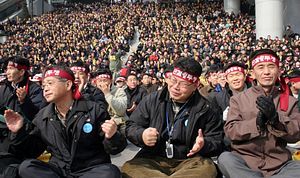On Monday, February 16, Kim Jae-gi, an employee of Kumho Tires, set himself ablaze on top of a factory in Gwangju, South Jeolla Province, in an act of symbolic protest against the irregularization of his company’s workforce. He left behind a letter in which he wrote: “Just because I died doesn’t mean the world of labor will change, but I hope, at least, our Kumho Tires will change.” The letter is reproduced in this Kyunghang Shinmun article (and elsewhere). Kumho Tires is a South Korean tire company headquartered in Gwangju.
In 2010, Kumho Tires negotiated a so-called “workout,” whereby most of its workforce would be converted from full time employess to contract workers. This process has been ongoing since then. Contract work is a considerably more volatile form of employment, with significantly fewer benefits and little to no job security. Because of this structural change to its labor force, the labor union (representing Kumho workers) is holding Kumho responsible for Kim’s death.
The labor union and management disagree over the reason behind Kim’s suicide, but it appears as if it was intended as a dramatic symbolic protest against changing working conditions. The protest need not be viewed in isolation, or as an act directed only at Kumho Tires.
As discussed elsewhere, the pressures of global capitalism have in many ways driven the deregulation of the South Korean labor market. In times past, when full-time or “life-time” employment was more common, one joined a company and stayed there for good (or at least for a very long time).
But with the spread of neo-liberal policies in the 1990s and major structural adjustments following the 1997 Asian Financial Crisis, employment has become both harder to find and more precarious. Last year, the Chosun Ilbo reported that “non-regular jobs” in Korea are more common now than before: “The number of Koreans working on a contract basis rather than a full job stood at 6.08 million as of August [2014], up 2.2. percent.” Many of the workers taking these jobs, it is noted, are recent college graduates.
Of course, working conditions are a far cry from what they were in the 1960s and 1970s, when sweatshop-like working conditions at the Seoul Peace Market lead Jeon Tae-il, a workers’ right activist, to commit suicide by self-immolation in protest. But to make a direct comparison between Jeon and Kim (which readers may be inclined to do) is to miss the point.
Jeon committed suicide in protest of the social harms of rapid industrialization; Kim’s act is in opposition to the social dislocations of postindustrial capitalism. While both men intended to raise awareness of blue-collar working conditions, understanding the timing of each act is crucial. While Jeon’s sacrifice may not have meant much for workers in the industrial West, Kim’s protest against volatile working conditions will resonate with similarly frustrated Americans, Canadians, or Greeks.

































